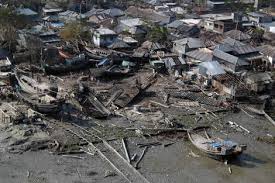Six Tiny Island Countries To Sue Big Oil For Disrupting the Climate

(EnviroNews World News) — Port Vila, Vanuatu — On Monday, June 8, 2015, members of the G7, the world’s seven largest countries, met in Germany where an historic promise was made by world leaders — a pledge to rid the earth of carbon burning by the year 2100. On the same day, six tiny island nations also met with a climate agenda — in Southeast Asia — and they had a promise to make as well, as they released the People’s Declaration for Climate Justice.
If the G7 is Goliath, then the six countries offering up the declaration are definitely David. Those participating nations are: Vanuatu, Kiribati, Tuvalu, Fiji, Solomon Islands and the Philippines — and they are planning to sue large transnational carbon polluters. The international coalition of six states in its document:
We, the people of Vanuatu, Kiribati, Tuvalu, Fiji, Solomon Islands and the Philippines continue to experience the impacts of climate change – the single biggest human rights, environmental and humanitarian crisis of our time… As the people most acutely vulnerable to the impacts of climate change, we will not let the big polluters decide and assign our fate… We commit to holding those most responsible for climate change accountable. By doing so, we send a message of hope that the people and not the polluters are in charge of humanity’s destiny.

In conjunction with the declaration, Greenpeace Southeast Asia is also preparing to petition the Philippines Commission on Human Rights to launch an investigation into “big polluters” in regards to their role in human rights violations associated with climate change, Climate Progress reports.
Activists, environmentalists and climate scientists alike ridiculed the G7’s target date of 2100, saying that the proposed course of action is far too slow to prevent irreparable harm to the climate, the oceans, and the world’s ecosystems.
There can be little dispute that these six countries, and other island nations like Marshall and Burma have been hit first, and hit hardest by the effects of global climate destabilization.

A near doubling in the frequency of extreme weather events, coupled with fast moving coastline disappearance due to sea level rise, is already wreaking havoc and causing distress in the islands. Additionally, ocean acidification from large-scale Co2 absorption by the oceans is killing reefs and decimating fish and shellfish populations alike — seafood populations that provide an absolutely vital source of protein for islanders worldwide.
Taking all things into account, holding transnational fossil fuel companies’ feet to the fire won’t be easy, and the coalition of nations will likely have to face several issues with standing before even getting a day in court. “If you are citizens in Fiji and you want to sue Chevron, you’re going to have jurisdictional questions,” David Hunter, Director of the Program on International and Comparative Environmental Law at American University’s Washington College of Law, told ThinkProgress.
The People’s Declaration for Climate Justice adds to several other climate-oriented legal cases already bubbling in different locations around the globe. Now we wait and see if the Southeast Asian decree will result in culpability for any of the world’s largest fossil fuel giants.
The declaration in its entirety can be seen just below:
Port Vila, Vanuatu
Date: 8 June 2015
We, the people of Vanuatu, Kiribati, Tuvalu, Fiji, Solomon Islands and the Philippines continue to experience the impacts of climate change – the single biggest human rights, environmental and humanitarian crisis of our time. It has claimed thousands of lives, displaced millions of people, damaged livelihoods, and caused a severe economic toll in relief, rehabilitation and reconstruction efforts.
The burning of fossil fuels by big polluters has been found to be primarily responsible for emitting large amounts of greenhouse gases. The concentration of said gases, especially carbon dioxide in the atmosphere causes climate change. An estimated 25-30% of the carbon dioxide emitted by these activities was absorbed by the oceans, causing ocean acidification.
As the people most acutely vulnerable to the impacts of climate change, we will not let the big polluters decide and assign our fate. Our rights and ability to survive must not be dictated by the continued addiction to the burning of fossil fuels. We refuse to accept the “new normal” and demand for climate justice by holding the big polluters and their respective governments to account for their contribution to the climate crisis. Our people and our environment must be preserved for the generations to
come.
We are from island states in shared oceans. We stand in solidarity.
We commit to holding those most responsible for climate change accountable. By doing so, we send a message of hope that the people and not the polluters are in charge of humanity’s destiny.
We commit to bring a case that would investigate the human rights implications of climate change and hold the big carbon polluters accountable to appropriate international bodies or processes.
FILM AND ARTICLE CREDITS
- Emerson Urry - Journalist, Author


![Leading the Charge for America’s Wild Horses on Capitol Hill: NBA/NFL Celeb. Bonnie-Jill Laflin: ‘[Politics] won’t stop us from fighting’](https://cf-images.us-east-1.prod.boltdns.net/v1/static/1927032138001/f46b2158-cead-47f0-ab44-4b027059411a/4e4afcf2-937d-4a9d-acba-1b82e2efd4c6/160x90/match/image.jpg)



1 thought on “Six Tiny Island Countries To Sue Big Oil For Disrupting the Climate”